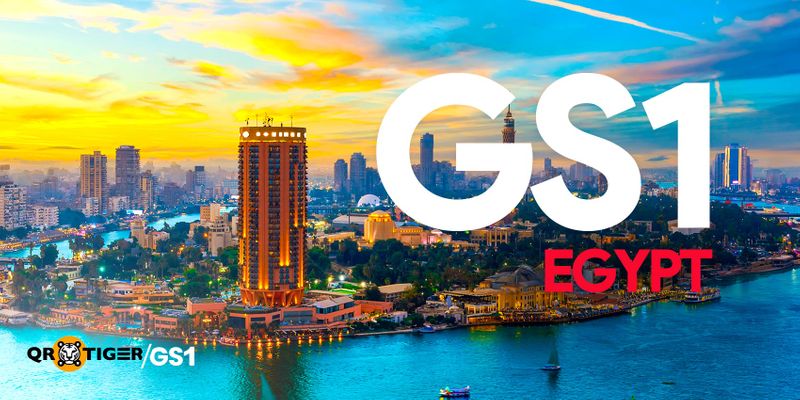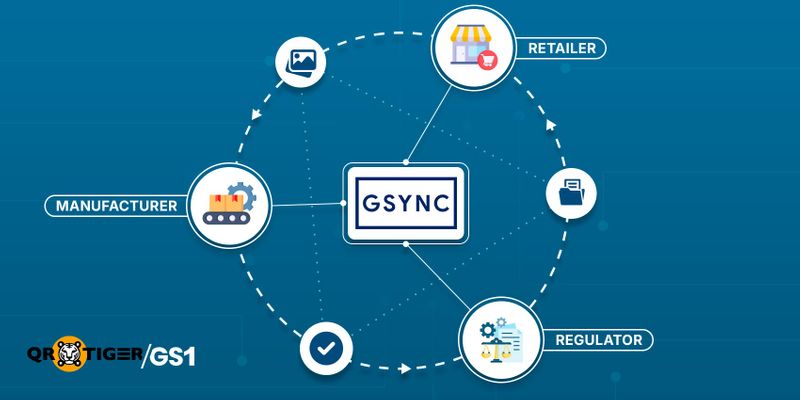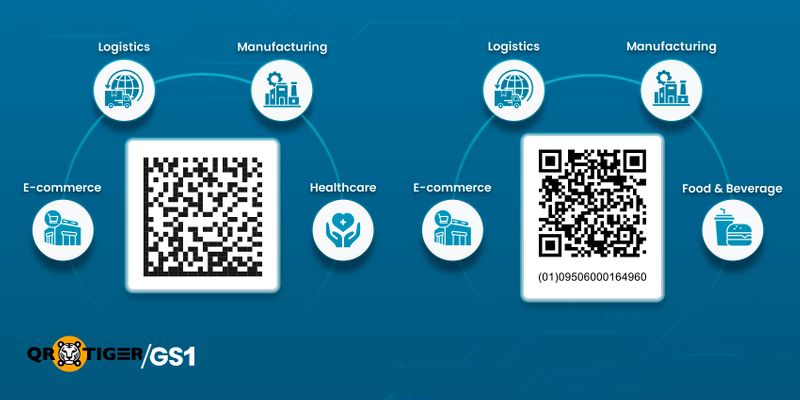GS1 Egypt: Driving Smarter and Transparent Supply Chains

From manufacturing to healthcare, Egyptian industries are using digital systems to manage product data and meet regulatory requirements. To make these systems work well, products must be clearly labeled and data shared properly.
GS1 Egypt plays a vital role in providing globally recognized standards that help Egyptian businesses work efficiently and comply with industry regulations. Its services, ranging from barcode registration to tools for data sharing, enable businesses to connect with global markets and meet rising consumer and regulatory expectations.
This blog explores how GS1 empowers industries to use global barcodes and data standards to improve product traceability, safety, and operational efficiency.
It also highlights Egypt’s shift toward advanced 2D barcodes for smarter data capture and smoother supply chain management.
Table of Contents
What is GS1 Egypt?
Founded in 1997, GS1 Egypt (EG) is the Egyptian division of the global standardization organization GS1. It’s the only authorized entity licensed to issue GS1 barcodes and Global Trade Item Numbers (GTINs) in Egypt.
The member organization (MO) is responsible for helping implement and manage GS1 standards across the country. It follows global GS1 guidelines to help businesses identify products, share data, and improve supply chain visibility.
GS1’s unique identification system, such as barcodes and RFIDs, enables companies to track goods and services from production to delivery. It has served over 18,000 local members. It partners with trading communities to support safer, more sustainable, and transparent supply chain chains.
Contact information:
Address: 72 El-Nozha Street, Almaza, Heliopolis, Cairo Governorate, Egypt
Contact no: +20 2 20822135
Email: info@gs1eg.org
Introduced initiatives and collaborated campaigns
GS1 EG partners with industry leaders to promote global standards that drive digital transformation and smarter supply chains.
GS1 EG and Unified Procurement Authority (UPA) for improved drug tracking
GS1 EG signed a cooperation protocol with the UPA, an Egyptian organization affiliated with the Presidency of the Council of Ministers.
This agreement integrates GS1’s global tracking solutions like Track & Trace and EPCIS (Electronic Product Code Information Services) into Egypt’s pharmaceutical supply chain, allowing medicines to be tracked from production to the end consumer.
By using GS1 standards such as GTINs and GLNs, the system ensures accurate product identification and location tracking. EPCIS acts as a shared language between companies and the UPA, replacing manual data exchange and improving inventory management.
This collaboration boosts medicine safety, enhances supply chain transparency, and strengthens Egypt’s position in global pharmaceutical markets.
Egyptian Drug Authority (EDA) and GS1 EG
GS1 EG has partnered with the Egyptian Drug Authority (EDA) to strengthen the country’s pharmaceutical supply chain and protect public health. This partnership supports manufacturers, healthcare providers, and pharmaceutical companies by promoting the use of global identification standards.
The EDA requires every medicine to carry a GS1-compliant Data Matrix code. This code includes key details like the product’s GTIN, batch number, expiry date, and a unique serial number. These identifiers aren’t just for individual packs; they also apply to larger packaging levels, creating a layered tracking system from factory to pharmacy.
By enabling full traceability, GS1 EG and EDA help control counterfeit drugs, improve transparency, and ensure patients receive safe, authentic medications.
Egypt Healthcare Authority (EHA) and GS1 EG
The Egypt Healthcare Authority (EHA) is upgrading the country’s healthcare system with modern technology and global standards. In partnership with GS1 EG, it uses a numbering system to track medical items in hospitals, making care safer and more reliable for patients under the Universal Health Insurance system.
This collaboration supports better coordination of supply chains, reduces waste and costs, and ensures compliance with healthcare regulations. The GS1 system enables accurate tracking of medicines and medical devices, enhancing transparency and efficiency in both operations and digital systems.
Luxor and Ismailia are the first regions to start using GS1’s smart tracking system to improve healthcare services. GS1 and EHA leaders have shown strong support for innovation and safer, more efficient healthcare services across Egypt.
GS1 EG services for businesses
GS1 provides services that make product identification, tracking, and data sharing easier. From barcodes to end-to-end food traceability, the services help businesses run smoothly and build trust.
GTIN and GLN services
Global Trade Item Number (GTIN): GS1 offers GTINs to help businesses uniquely identify every product they sell, whether in retail, healthcare, agriculture, or logistics. This global standard simplifies product tracking, supports e-commerce platforms, and improves operations in fulfillment centers, farms, packing houses, and cold storage facilities.
Global Location Number (GLN): The Global Location Number (GLN) is a unique identifier that helps businesses find, track, and share location details more easily. GS1 helps you create and manage GLNs to improve supply chain accuracy and speed.
Healthcare Location Registry Platform
GS1 Egypt’s Healthcare Location Registry Platform (HLRP) is a centralized system that assigns and verifies GLNs for hospitals, clinics, distributors, and suppliers. Unlike simply obtaining a GLN, which only provides a unique identifier, HLRP validates these GLNs and connects them to Egypt’s national healthcare network.
HLRP ensures that healthcare locations meet the standards set by the Ministry of Health (MOH) and the EDA. It offers real-time verification of healthcare facilities and supply chain partners. It connects securely with e-health systems, procurement platforms, and customs authorities, making healthcare operations safer, faster, and more efficient.
GSYNC – Product Master Data Synchronization

The GSYNC platform helps businesses manage and share accurate product information. It allows retailers, manufacturers, and regulators to use one standard system for storing and sharing product data, keeping all stakeholders aligned.
With GSYNC, you can avoid errors and duplication, keep your product details up to date, and meet industry and healthcare compliance standards. It also automates catalog updates, saving time and reducing manual work.
For businesses dealing with retail, food, or pharmaceutical industries, GSYNC helps keep all product details in one reliable place.
OneTrace
OneTrace is a digital tool developed in 2008 through a GS1 Egypt and ARTCO (Arab Agricultural for Vegetable and Fruit Packaging) partnership. It helps businesses track every step of the food supply chain, from farm to packing, shipping, and retail. It uses global standards like GTIN, GLN, and barcodes to help meet traceability rules in the EU and Gulf markets, build brand trust, and improve control over operations.
With OneTrace, you can monitor farm activities like crop treatments and harvesting, manage packing and labeling at packhouses, and track shipments from source to destination.
It also supports quality checks across farms, greenhouses, cold storage, and more, making it easier to ensure safety, reduce waste, and meet export requirements.
One Print
One Print is GS1 EG’s labeling system that helps businesses create accurate barcodes and labels for products, packaging, and logistics. It supports global standards like GTINs, SSCCs (Serial Shipping Container Codes), and UDI (Unique Device Identification), making it easier to meet compliance and traceability needs across industries.
With this service, you can design flexible label templates, use 2D barcodes with serialization for added security, and create bilingual labels in Arabic and English to meet local rules.
Whether you are a small business or a large manufacturer, the service helps reduce labeling errors and keeps your supply chain running smoothly.
Product Connect
Product Connect is GS1 Egypt's professional product photography service that offers the highest quality product photography in Egypt, following GS1 global standards.
It gives businesses the chance to dazzle their customers with perfect displays of their products. It's designed to help brands present their products professionally for e-commerce, marketing materials, catalogs, and online marketplaces.
The process for a business to utilize Product Connect is streamlined into four main steps:
- Book a Session: The company contacts GS1 Egypt to schedule a photography and data submission session.
- Bring your Products: The physical products are brought to the GS1 central office.
- The Photoshoot: GS1 EG handles the professional photoshoots, data entry, and digital profile creation.
- You Get Access: The company receives access to download their photos and product data, and their custom webpage is available to share online.
Applications of 2D barcodes across industries in Egypt
By 2027, retail is set to embrace smarter labeling with 2D barcodes. These next-generation codes hold far more data than traditional 1D barcodes, making it easier to track products and connect with customers more effectively.
This global shift, led by the GS1 Sunrise 2027 initiative, is designed to bring greater clarity and efficiency to shopping, both online and in physical stores. The switch isn’t compulsory yet so businesses can still use 1D barcodes if their industry regulations allow.
To ease the transition, many companies are adopting dual marking (incorporating both 1D and 2D barcodes on packaging). This approach keeps existing systems operating smoothly and simultaneously prepares for upcoming tech upgrades in retail.
To prepare for Sunrise 2027, businesses have two options: they can either create GS1-compliant 2D barcodes on their own by following GS1’s official guidelines, or they can use trusted third-party tools like QR Tiger’s GS1 QR code generator.
For teams short on time or technical know-how, these external solutions offer a quick and reliable way to generate and apply next-generation barcodes, making the transition smoother and more manageable.

Here are some of the key applications of these codes across industries in Egypt:
Retail
Retailers are leveraging GS1-compliant 2D barcodes to enhance inventory management and point of sale (POS) operations. Big supermarkets and online shops now use QR codes and Data Matrix barcodes to speed up checkout, trace where products come from, and share promotional content.
Since these barcodes hold more information than traditional 1D codes, stores can embed nutrition details, expiry dates, and traceability information directly into the product label.
For example, shoppers can scan a GS1 Digital Link QR code to access product information, reviews, and brand content. With these codes, retail brands can connect products to rich online content, improving customer engagement and transparency.
Healthcare and pharmaceuticals
The healthcare industry uses GS1 DataMatrix to enhance patient safety and pharmaceutical traceability. Hospitals and clinics use them to track medications and medical devices from manufacturer to patient. This ensures accurate administration, reduces human error, and supports swift recall actions when needed.
Pharmaceutical companies are also using these codes to comply with international serialization regulations. These codes help track drugs from production to the end-user, reducing counterfeit medicines.
The Ministry of Health has encouraged barcode integration to make supply chains more transparent and comply with regulations.
Manufacturing and logistics
In the manufacturing sector, 2D barcodes are important for production line automation and quality control. Factories use them to tag components and finished goods, facilitating effective tracking and reducing bottlenecks. This is particularly relevant in the automotive and electronics industries, where precision and traceability are crucial.
Scan4Transport is GS1’s standard for logistics. It allows important shipping details (such as destination, safety alerts, and handling instructions) to be stored in a 2D barcode on transport labels. This speeds up scanning, improves delivery routes, and gives better visibility across the supply chain.
Along with this, GS1 Digital URI turns key label data into a URL. This means the 2D barcode can link directly to online content, allowing stakeholders to access detailed supply chain information.
For example, whenever a supply chain partner scans a GS1 QR code, they can instantly review shipment updates, handling steps, or compliance information.
Food and agriculture
Farmers and agribusinesses are adopting 2D barcodes to ensure food safety and traceability. These codes track where produce comes from, what pesticides were used, and the method adopted to keep it fresh.
Inspiring Success Stories from GS1 EG
GS1 EG has supported companies across industries in enhancing product tracking, safety, and operations. These real-world success stories highlight how GS1 standards strengthen supply chains and increase consumer confidence.
Al Shams Agro Group
Al Shams Agro Group, a citrus producer founded in 1993, partnered with GS1 EG to implement an automated traceability system that transformed its operations.
With support from the Egyptian Traceability Centre for Agro-Industrial Exports (Etrace) (a joint initiative by UNIDO and Egypt’s Ministry of Trade and Industry), the company adopted GS1 standards to meet international food safety and traceability requirements.
This system tracks every carton of fresh produce from Al Shams’ packing houses to its final destination, ensuring full visibility and control over product quality and origin.
Using GS1’s Global Traceability Standard, Al Shams uniquely identifies each lot of produce and records detailed data on its source, treatment, packaging, and shipment. Key GS1 identifiers are applied across the supply chain, enabling precise tracking of batches, harvest dates, and pallet movements.
This digital transformation replaced manual processes and allowed Al Shams to automate stock management, labor reporting, logistics, and FIFO enforcement, significantly reducing spoilage and improving operational efficiency.
Al Shams Agro Group quickly saw big improvements after using the GS1 traceability system. They became known as a top citrus brand in the Mediterranean, cut down customer complaints and solved issues much faster, by over 75%. They also met all food safety rules from Etrace, the EU, and global buyers.
The company saw a return on investment within just two export seasons and now plans to unify all food safety certifications under the same system.
EIPICO
EIPICO is one of Egypt’s top pharmaceutical manufacturers and exporters, known for producing high-quality medicines and using advanced technology to improve operations. To strengthen safety and efficiency, EIPICO adopted GS1 standards to secure its supply chain, meet regulatory requirements, and fight counterfeit drugs.
Using EPCIS, a GS1 standard for sharing product movement data, EIPICO can track key details like what the product is, where it’s been, when it moved, and why. This improves traceability, boosts data visibility, and allows smooth sharing of product information across the supply chain.
EIPICO was also among the first in Egypt to launch a full Track and Trace Program, including serialization, aggregation, and system integration (Levels 3 and 4). This helps keep patients safe, meets global rules, and stops fake products.
Why register GS1 EG?
GS1 EG helps businesses work efficiently, track products better, and expand globally using standardized identification and data-sharing systems. Here are reasons to choose GS1 EG:
- It’s the only official source for barcodes in Egypt.
- Trusted by both government and private companies for digital upgrades.
- Offers expert help, training, and tools to follow rules and expand globally.
- Supports international Track & Trace systems, healthcare changes, and smart delivery systems.
- MyGS1 is a safe platform for managing product data across industries.
 Supporting Egypt’s Digital Shift with Global Standards
Supporting Egypt’s Digital Shift with Global Standards
GS1 Egypt helps businesses work smarter using global standards to improve product tracking, data sharing, and supply chain transparency. From healthcare and retail to agriculture and manufacturing, its services make it easier for companies to meet rules, avoid errors, and grow in local and global markets.
Through strategic collaborations and initiatives, GS1 Egypt supports the country’s move toward digital and efficient supply chains. Joining GS1 connects businesses to a trusted global system, helping them stay ready for the future and succeed in a fast-changing marketplace.
Frequently asked questions
1. How does GS1 EG help businesses follow Egyptian regulations?
GS1 EG makes it easy for businesses to meet government requirements. It connects with regulatory bodies like the Egyptian Tax Authority (ETA), EDA, and UPA. It enables e-invoicing, product registration, and traceability, helping businesses operate efficiently and avoid penalties.
2. Can GS1 EG barcodes be used on global platforms like Amazon?
Yes, these barcodes are globally accepted and assist Egyptian businesses in listing products on platforms like Amazon, Jumia, and Carrefour. This improves product visibility, reduces listing errors, and speeds up market entry.
DISCLAIMER: We acknowledge that GS1, as well as the materials, proprietary items, and all related patents, copyright, trademark, and other intellectual property (collectively, “intellectual property”) relating to its use, are the property of GS1 Global, and that our use of the same shall be in accordance with the conditions provided by GS1 Global.



